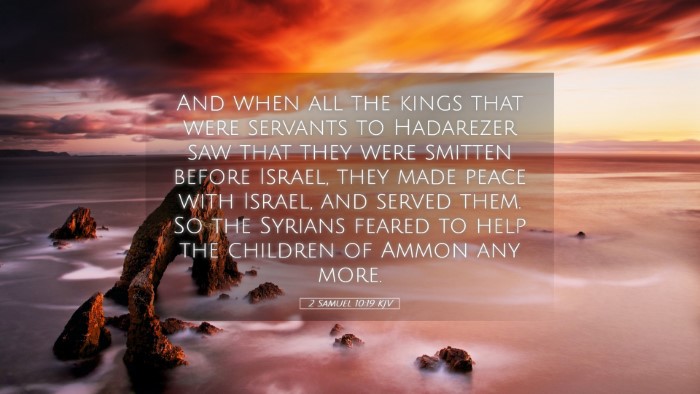Old Testament
Genesis Exodus Leviticus Numbers Deuteronomy Joshua Judges Ruth 1 Samuel 2 Samuel 1 Kings 2 Kings 1 Chronicles 2 Chronicles Ezra Nehemiah Esther Job Psalms Proverbs Ecclesiastes Song of Solomon Isaiah Jeremiah Lamentations Ezekiel Daniel Hosea Joel Amos Obadiah Jonah Micah Nahum Habakkuk Zephaniah Haggai Zechariah Malachi2 Samuel 10:19
2 Samuel 10:19 KJV
And when all the kings that were servants to Hadarezer saw that they were smitten before Israel, they made peace with Israel, and served them. So the Syrians feared to help the children of Ammon any more.
2 Samuel 10:19 Bible Commentary
Commentary on 2 Samuel 10:19
Context and Background
The book of 2 Samuel chronicles the reign of King David, highlighting his successes, failures, and the moral and spiritual lessons therein. Chapter 10 specifically deals with David's military campaigns against the Ammonites and the subsequent conflict with the Arameans. The events leading to 2 Samuel 10:19 demonstrate a significant turning point in David's relations with surrounding nations.
Verse: 2 Samuel 10:19 (KJV) - "And when all the kings that were servants to Hadarezer saw that they were smitten before Israel, they made peace with Israel, and served them."
Verse Analysis
This verse captures a strategic consequence of the military confrontation. The kings who were previously allied with Hadarezer recognized the might of Israel after their defeat. The acknowledgment of Israel’s supremacy led to a shift in allegiance, emphasizing the broader theme of power dynamics in ancient Near Eastern diplomacy.
Theological Insights
The theological implications of 2 Samuel 10:19 revolve around themes of divine sovereignty and the fulfillment of God’s promises to Israel. Throughout the narrative, it becomes evident that victories in battle are often viewed as manifestations of God’s favor.
- Divine Sovereignty: The victory is not just a military achievement but a reflection of God's control over nations. As Matthew Henry remarks, "It is not from the power of arms, but from the hand of God that victories are won."
- Peace through Power: The resulting peace initiated by the defeated kings exemplifies the adage that might can lead to peace, a concept appearing throughout Scripture that emphasizes the necessity of acknowledging God’s sovereignty.
- Fulfillment of Promises: This moment underscores the precedence of God fulfilling His covenant with Israel, as what's demanded of Israel—obedience—sets the stage for their triumphs.
Insights from Public Domain Commentaries
This verse has been interpreted by several esteemed commentators:
- Matthew Henry: Henry emphasizes the significance of God’s hand in the rising power of Israel, pointing out that the subduing of surrounding nations not only demonstrates physical dominion but ushers in a period of stability for Israel.
- Albert Barnes: Barnes notes the political ramifications, suggesting that Hadarezer’s defeat discredited him among his allies. The resulting shift to Israel’s favor indicates a recognition of power and the preferring of survival over enmity. Barnes also reflects on the diplomatic savvy of David, who positioned Israel as a dominant power.
- Adam Clarke: Clarke reflects on the narrative's implications for Israel as a covenant nation, suggesting that God's backing is crucial in these diplomatic relations and military endeavors. He posits that the text illustrates the responsiveness of surrounding nations to God's dealings with Israel.
Application for Today
For modern readers, particularly pastors, students, and theologians, this verse presents profound lessons regarding leadership, the nature of authority, and the role of faith in societal dynamics:
- The Role of Righteous Leadership: Leaders are called to be reflections of God's justice and righteousness, recognizing that true power comes through submission to God's will.
- The Power of Peace: The verse suggests that the strength and integrity of a nation can lead to peace. Modern implications encourage leaders to pursue peace through integrity rather than through coercion.
- Recognizing God’s Sovereignty in Politics: Understanding the interplay between faith and governance is critical. David's story serves as a reminder that God’s plans unfold within the complexities of human politics.
Conclusion
2 Samuel 10:19 holds significant historical and theological weight that resonates deeply in contemporary discussions about leadership, power, and God’s sovereignty. By reflecting on insights from established commentaries, scholars can appreciate the intricacies of the scripture and apply its lessons effectively in today's context.


